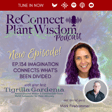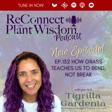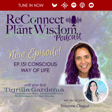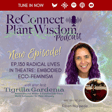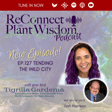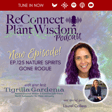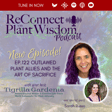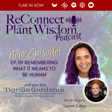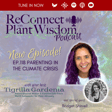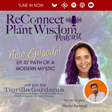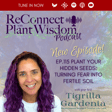
Ep.121 Interspecies Garden Relationships with Matthieu Mehuys
I sit down with regenerative garden designer and landscape architect Matthew Mehuys to rethink what a “garden” actually is. We move past domination language and into relationship—how to design living spaces where humans, plants, soil, fungi, and wildlife co-create. We unpack low-maintenance (read: ecosystem-literate) design, right plant/right place, and succession as the real secret to beauty with ease.
We also touch garden history (from walled formality to naturalistic planting), why suburbs can be biodiversity hotspots, and how companies benefit when biophilic spaces nurture people, not just property values. If you’ve ever felt the tension between aesthetics and aliveness, this one will shift your vocabulary—and your planting plan.
Topics Covered about Regenerative Garden Design
➡️ Design as relationship: from “controlling Nature” to co-creating with plant kin
➡️ The true path to low maintenance: soil health, succession, and species fit
➡️ Urban and corporate spaces that invite touch, awe, and ongoing interaction
➡️ How language shapes design choices—and client outcomes
Chapters
00:00 Exploring the Garden as Co-Creation
08:19 The Art of Listening Below Ground
16:37 Microbial Kinship and Nonlinear Growth
25:06 Letting Nature Take the Lead
28:01 Podcast with Zencastr (Ad)
33:21 Interspecies Dialogue
41:44 Reclaiming Wonder in the Garden
Resources Mentioned
🌱 Matthew’s Regenerative Garden online masterclass + free 30-min training/call
🌱 Matthew’s book: 12 Universal Laws of Nature
🌱 Naturally Conscious Community
🌱 My Friday Plant Consciousness Commentary series
Expanded Show Notes
☝🏽ReConnect with Plant Wisdom podcast Ancient and modern knowledge from biology to spirituality about the wondrous ways plants help you lead a Naturally Conscious life.
Subscribe here and on your favorite podcast player.
👉🏽 Join the Naturally Conscious Community to nourish human-plant relationships
// Get to Know Me, Tigrilla //
// Let's Work Together //
// Shop from EcoConscious Partners //
The Shift Network
More Partners
Opening and Closing music by @Cyberinga and Poinsettia.
// Let's Connect on Social // Facebook | Instagram | LinkedIn | Youtube

